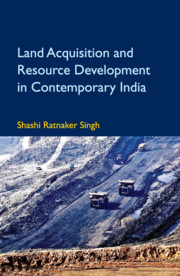Book contents
- Frontmatter
- Contents
- List of Figures
- List of Maps
- List of Tables
- List of Abbreviations
- Foreword
- Acknowledgements
- Part I Theoretical Framework
- 1 Introduction: From Colonial Regime to ‘Welfare State’?
- 2 State, Space and People
- 3 Land, Mines and Minerals
- 4 Land Acquisition and Resource Development in India
- 5 Resource Development and Compensation Issues
- Part II Case Study
- 6 Singrauli: A ‘Space’ of Dependence
- 7 Singrauli: A Development Dilemma
- 8 Administering Singrauli: Governance and Institutions
- 9 Land Acquisition and Its Socio-economic Implications: Field Survey
- Part III Analysis
- 10 Understanding Development
- 11 Conclusion
- Appendix: Memorandum from Mineral-Bearing States
- Bibliography
- Index
1 - Introduction: From Colonial Regime to ‘Welfare State’?
Published online by Cambridge University Press: 16 October 2020
- Frontmatter
- Contents
- List of Figures
- List of Maps
- List of Tables
- List of Abbreviations
- Foreword
- Acknowledgements
- Part I Theoretical Framework
- 1 Introduction: From Colonial Regime to ‘Welfare State’?
- 2 State, Space and People
- 3 Land, Mines and Minerals
- 4 Land Acquisition and Resource Development in India
- 5 Resource Development and Compensation Issues
- Part II Case Study
- 6 Singrauli: A ‘Space’ of Dependence
- 7 Singrauli: A Development Dilemma
- 8 Administering Singrauli: Governance and Institutions
- 9 Land Acquisition and Its Socio-economic Implications: Field Survey
- Part III Analysis
- 10 Understanding Development
- 11 Conclusion
- Appendix: Memorandum from Mineral-Bearing States
- Bibliography
- Index
Summary
In India, land policy has been a critical subject of public debate since Independence. Initially, the government adopted a socialist approach (partly) towards the economy and introduced legislation to redistribute land under land reform; however, it could only partially achieve this objective due to the political stronghold of the entrenched landed class in rural areas. Post-Independence, land was also acquired for various developmental projects such as dams, mines, highways, infrastructure and so on and the acquisition of land was justified as serving the ‘public purpose’ to achieve economic development. Land was acquired under the old colonial Land Acquisition Act (LA Act) of 1894, which was increasingly challenged for its inadequacy to deal with contemporary realities and unjust principles, even though there was little resistance to land acquisition due to low political consciousness and lack of civil society organizations to represent the voice of the people.
In the post-Independence era, land served as a critical means of realizing developmental objectives of the government. Land policies were guided by a socialist view, zamindari system was abolished, but redistribution of land was only partially successful, as the government had to strike a balance between its socialist objectives and the interests of the powerful landholders whose political assistance was necessary for electoral support in rural areas. The other factor was that land was a state subject and this prevented uniformity of laws on land, especially because of differences in political dynamics at the state level. Although this was not such a major concern, as the Congress party ruled most states and the Centre's dominance prevailed under Nehru's leadership, state-level politics with its own sociocultural complexities made disagreement unavoidable. The left-ruled states, like West Bengal and Kerala, could implement land reforms more successfully than others. Considering the social reality of the farming community, these state governments prioritized farmer's welfare over large-scale industrialization and infrastructure projects.
During the post-Independence period, a significant thrust was given to building dams and large infrastructure projects. But the Indian government continued with the same colonial legislation to acquire land throughout the country. Affected people continuously challenged the principles of compensation under the LA Act of 1894 and approached courts for justice. Considering the gross historical injustice embedded in the LA Act of 1894, the Government of India had significantly delayed the amendment of the LA Act of 1894.
- Type
- Chapter
- Information
- Publisher: Cambridge University PressPrint publication year: 2021



